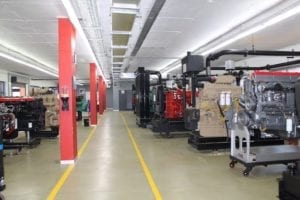Cummins has cemented its role as a pioneer in engine technology by launching the first Compressed Natural Gas (CNG) engine training programme in Africa. The programme is available through Cummins’ main training facility in Johannesburg, and is fully accredited by merSETA.
Operating with CNG requires a different approach to maintenance and servicing, particularly from a safety perspective. “Therefore it is absolutely key that, when our people work on these products, they understand the underlying dynamics,” John Shuttleworth, service operations director at Cummins, comments. The launch of the new training programme follows in the wake of CNG being touted as a ‘greener’ option for buses running in the Johannesburg and Cape Town metros, for example. “There is a lot of energy and discussion around alternative fuels and cleaner solutions in terms of public transportation in particular,” Shuttleworth notes. However, while Cape Town is already operating a few CNG buses, Cummins has highlighted a dearth of local training facilities and programmes in this regard. “Cummins prides itself on staying ahead of the technology wave. Therefore our latest CNG engine training programme is a clear example of our substantial investment into the region,” Shuttleworth adds. He explains that CNG offers ultra-low emissions, in addition to benefits such as exceptional performance and reduced engine noise. The fact that training is now available locally through Cummins means that technicians no longer have to be sent abroad for training.“OEMs interested in CNG can now rest assured that a local training programme is indeed up and running. While we have started to funnel our own internal technical people through the programme, in future we aim to offer it to the rest of the industry as well,” Shuttleworth stresses. Cummins has invested in a fully-trained and accredited technician to deliver the training programme. “Our investment in this regard is quite substantial, as it not only encompasses the actual training delivery, but also the necessary equipment and facilities,” Shuttleworth elaborates.
While the initial order of CNG automotive products introduced into South Africa is running on Cummins engines, Shuttleworth points out it is not the company’s aim to sell directly into this market at present. “We expect that this product will flow organically into the market via the OEMs. However, we still have a responsibility to support that product, and hence the establishment of the training programme.” It is anticipated that the training programme will be extended to include Southern Africa as a whole. “For example, we do have users in Mozambique and other regions interested in bringing in such products in quite high volumes. We certainly do not want to be playing catch up,” Shuttleworth explains. The new CNG engine training programme also represents the latest development of Cummins’ training methodology. “Our ultimate goal is to use a strong balance between virtual, theoretical and practical training as deployed in advanced industries so as to higher levels of understanding and training application. “We find there are so many new products coming in, particularly into Africa, that sometimes it is a challenge to stay ahead. Virtual simulation offers us an ideal opportunity to keep ahead of the learning curve, as well as allowing us to present training at our customers’ own facilities,” Shuttleworth elaborates.“Such training also makes good business sense as there is a lot more focus on environmental awareness and reducing emissions at the moment. Cummins is committed to designing and manufacturing products that comply with the latest standards and regulations,” Shuttleworth concludes.







